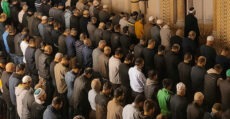Reference: al-Mulakhkhas al-Fiqhee – Volume 1, Pages 273-275
Question: What is required of the one who is unable to fast due to old age or a prolonged illness?
Response: Allaah (Subhaanahu wa Ta’aala) has obligated the fast of Ramadhaan upon all able Muslims and for those who have an Islaamically valid reason and are later able to do so, then they must make up the fasts that they missed. There is another category to consider and they are those who are unable to fast during Ramadhaan and other than Ramadhaan due to old age or a persistent illness. In this case, Allaah has made easy their affairs for them by requiring them to simply feed a poor person half a saa’ of the food of the land for every day (of Ramadhaan), this being a substitute for fasting.
Allaah (Subhaanahu wa Ta’aala) says:
{Allaah burdens not a person beyond his scope}, [Soorah al-Baqarah, Aayah 286]
He (Subhaanahu wa Ta’aala) says:
{And as for those who can fast with difficulty, (i.e. an old man, etc.), they have [a choice either to fast or] to feed a miskeen (poor and needy person) [for every day]}, [Soorah al-Baqarah, Aayah 184]
Regarding this, Ibn ‘Abbaas (radhi-yAllaahu ‘anhu) explains:
«That is for the old who are unable to fast», [transmitted by al-Bukhaaree]
As for the one who is suffering from a persistent illness, then his ruling is that of the aged, in that he is also required to feed a poor person for every day [of Ramadhaan].
As for he who is unable to fast due to changing circumstances, such as:
- The traveller;
- One who is ill and is expected to get better;
- A pregnant or breast-feeding woman who fears for herself or her child;
- A menstruating woman or one who is experiencing postpartum bleeding
…anyone who falls into any of the above categories is required to make up any fasts which they miss due to their Islaamically acceptable circumstances, as Allaah (Subhaanahu wa Ta’aala) says:
{…and whoever is ill or on a journey, the same number [of days which one did not observe Sawm (fasts) must be made up] from other days}, [Soorah al-Baqarah, Aayah 185]
So one who is considerably ill such that fasting will harm him and the traveller who is permitted to shorten his obligatory prayers, then it is from the Sunnah for them to refrain from fasting in such circumstances, as Allaah (Subhaanahu wa Ta’aala) says:
{…the same number [of days which one did not observe Sawm (fasts) must be made up] from other days}, [Soorah al-Baqarah, Aayah 185]; i.e. then do not fast, rather, make up those fasting days which are missed after Ramadhaan has passed.
Also, He (Subhaanahu wa Ta’aala) says:
{Allaah intends for you ease, and He does not want to make things difficult for you}, [Soorah al-Baqarah, Aayah 185]
And the Prophet ﷺ was known to opt for the easier of the two permissible choices. It is mentioned in al-Bukhaaree and Muslim that the Prophet ﷺ said:
«It is not from piety to fast whilst travelling»
However, if the traveller and one who was sufficiently ill and was to make experience difficulty in fasting were to fast, then that fast would be correct although it is disliked.
As for the menstruating women and the one experiencing postpartum bleeding, then it is prohibited for them to fast in such a state (until the complete respective terms and then take the ghusl of purification).
Regarding the pregnant and breast-feeding women, then it is obligatory on them to make up the fasts and those days they missed once Ramadhaan has passed. In addition, the one who did not fast because she feared for her child, then it is obligatory upon her to feed a poor person for each day missed.
It is obligatory upon the Muslim to make the intention for the obligatory fast during the night prior to the day of fasting; such as the fasting of Ramdhaan, the fast for a ransom or the fast for an oath or vow; by affirming the reason for which he is fasting, i.e. Ramadhaan or penalty or because of an oath or vow.
This is based upon the hadeeth of the Prophet ﷺ who said:
«Indeed, actions are but by intentions and for everyone is that which he intended…»
And on the authority of ‘Aa.ishah, he ﷺ said:
«Whoever does not make the intention before the arrival of Fajr, his fast is not correct»
So it is obligatory to make the intention for an obligatory fast during the night prior to the day of fasting. Whoever makes the intention during the day, such as the one who wakes up late after Fajr and without eating anything, then his fast is not acceptable if he has made the intention after waking up in this state.
However, this is permissible for voluntary fasts in that the intention is acceptable if it is made during the day since ‘Aa.ishah narrates that the Prophet ﷺ visited her at her house one day and said:
«Do you have anything [to eat]?»
…and she replied: “No”. So he said:
«In that case, I am fasting», [transmitted by Muslim]
Note, the Prophet ﷺ was not fasting at the time since he had asked for some food to eat. So in this there is evidence as to the permissibility of delaying the making of the intention to fast providing the fast is voluntary.
Please note: The condition for the acceptability of the intention to fast a voluntary fast during the day is that you must not have eaten or drunk anything since Fajr nor done anything which renders the fast invalid. If he had done any of this, then the fast for that day is not acceptable. In this regard, there is no difference of opinion between the scholars.





